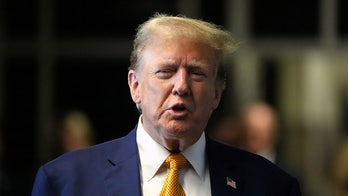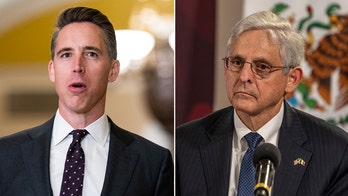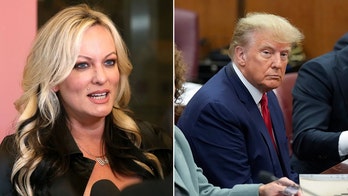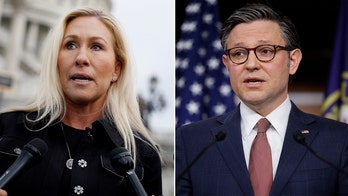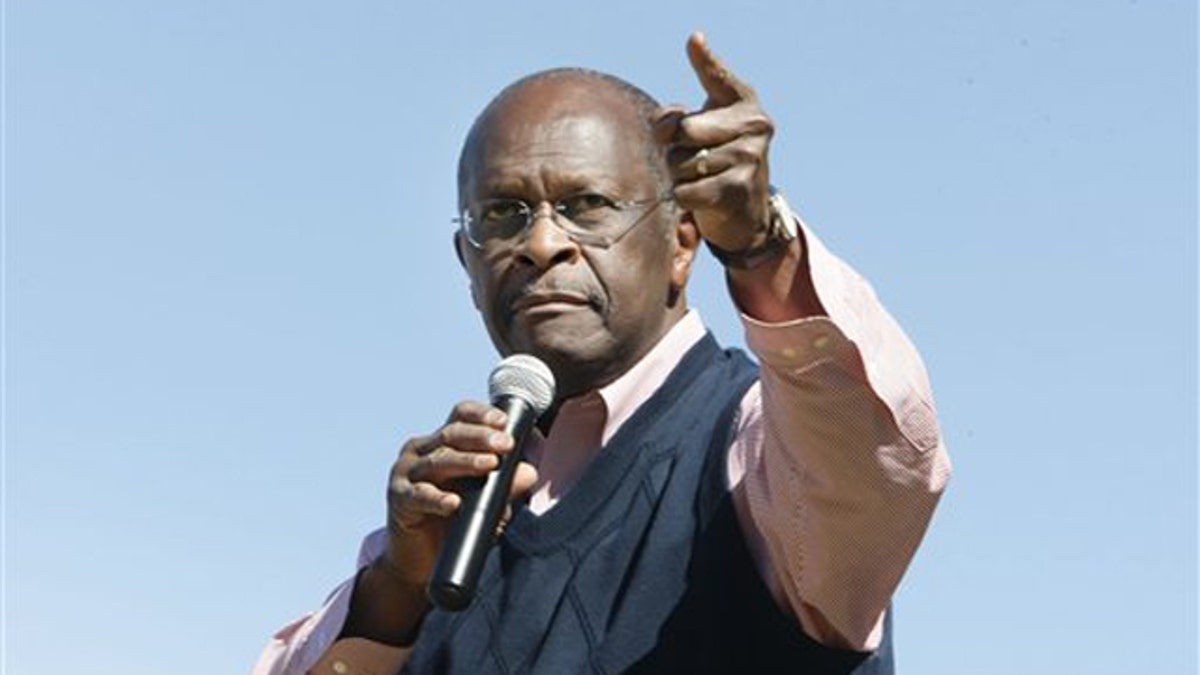
Oct. 14, 2011: Herman Cain addresses a crowd in Bartlett, Tenn. (AP)
With his polls on the rise, Herman Cain enters the Republican presidential debate in Las Vegas Tuesday night with all eyes taking a serious look at the candidate's substance, ratcheting up the pressure on the singing, ex-pizza CEO to prove he's more than just a simple joke-teller or the latest GOP runner-up.
Pulling even with fellow frontrunner Mitt Romney in recent polls, Cain's ability to sustain his surge and move decisively ahead of the former Massachusetts governor may depend on a little more discipline and organization from the candidate. Cain is now being closely watched not only for his 9-9-9 economic plan but also for any miscues, off-color jokes or gaffes he may be forced to defend later.
Since announcing his candidacy in May, Cain has managed to brush off the occasional critique of his sense of humor, reminding the GOP electorate that he's not a typical politician. He's also had to dismiss concerns that he's "insensitive."
But ahead of the debate, the former Godfather's Pizza chief has been getting hammered by Hispanic advocacy groups for suggesting the country construct an "electrified" border fence to keep out illegal immigrants -- "with a sign on the other side that says it can kill you."
Cain says he was just kidding though he defended his border control proposal that includes "a combination of a physical fence, technology, and in some terrible areas we might have to put troops there."
He offered a similar explanation about his dry humor after he was mocked for telling a crowd that all bills would be "three pages" if he were elected.
Most recently, Cain told NBC's "Meet the Press" on Sunday he was "not familiar with the "neoconservative movement" -- the ideology that enjoyed its heyday during the George W. Bush administration and is most associated with the dawn of the Iraq war. An aide later told The Daily Caller that Cain had in fact heard of neoconservatism and just didn't "want to be labeled."
Cain similarly got tripped up back in May when he was responding to a question on "Fox News Sunday" about the so-called Palestinian right of return -- the hotly contested demand by Palestinians that diaspora who left as far back as 1948 and their descendants should be allowed to return to Israel or any future land that will form a Palestinian state.
Cain said in the interview that he didn't think the Israelis had a "big problem" with people returning. His campaign later cleaned up the response and issued a statement saying the right of return is something Israeli governments have "rejected" and is not something the United States should encourage.
For now, any foreign policy deficit Cain is working to overcome has been sidelined by his cachet on the economic front.
While he raised eyebrows in a debate last week in which he said his economic advisers are from the American people, as a businessman promising private-sector solutions for an economy in dire straits, Cain has surged to the front of the pack with his 9-9-9 tax plan, which has been both credited and faulted for its simplicity.
9-9-9 involves a 9 percent income tax, 9 percent corporate tax and 9 percent national sales tax. It has served the dual role of answering widespread frustration with the current complex and favor-laden tax code and bolstering Cain's image as an outside-the-box, non-politician candidate.
While he has deftly batted down questions about the assumptions in his plan, he also was challenged at the last debate about the chances of such a radical tax overhaul getting through Congress. Cain responded by accusing his opponents of looking at the problem through a politician's lens.
"Therein lies the difference between me, the non-politician, and all of the politicians," he said. "They want to pass what they think they can get passed rather than what we need, which is a bold solution. 9-9-9 is bold, and the American people want a bold solution."
Steve Hayes, a columnist for the Weekly Standard and a Fox News contributor said Cain's objective Tuesday night will be demonstrate that he can be the outsider but allow people to understand "that he could actually do the job if you win it."
Former George W. Bush adviser Karl Rove agreed that Cain still has to prove he's a serious contender who can build out his organization in early primary states.
"He does have momentum, he does have passion, he does have enthusiasm. He doesn't have much in the way of money and he certainly doesn't have much in the way of a presence in the early states that make or break a candidate," he said.
Former colleagues of Cain's at the Federal Reserve in Kansas City, where he served as deputy director for two years before becoming chairman from 1995-1996, say they think he has the skills to be president. And a Rasmussen Reports poll released ahead of the debate showed Cain leading Obama 43-41 percent in a hypothetical general election match-up, within the margin of error.
That still hasn't convinced veteran poll watchers.
"You know what I learned about polls at this point of a primary or caucus process?" asked Larry Sabato, director of the University of Virginia's Center for Politics. "They are cotton candy, and they will disappear in the mouth very quickly ... become liquid sugar."
Sabato said so far there have been five frontrunners in the GOP contest. They include Cain, Romney, Texas Gov. Rick Perry, Minnesota Rep. Michele Bachmann and even unannounced candidate, New Jersey Gov. Chris Christie
"As much as Herman Cain says he doesn't wants to be the flavor of the month, the odds are he's
the flavor of the month or two months," Sabato said.
With the race still undecided, each of the would-be nominees is trying to break out of the pack. Perry is in the middle of announcing a series of detailed economic proposals, something that's been missing from his campaign at recent debates. His most recent plan dealt with making America more energy dependent, in part by increasing domestic drilling.
Former House Speaker Newt Gingrich is also looking to build on a string of strong debate performances, while Texas Rep. Ron Paul offered a $1 trillion federal spending plan on Monday and former Pennsylvania Sen. Rick Santorum has suggested zeroing out taxes on manufacturers.

